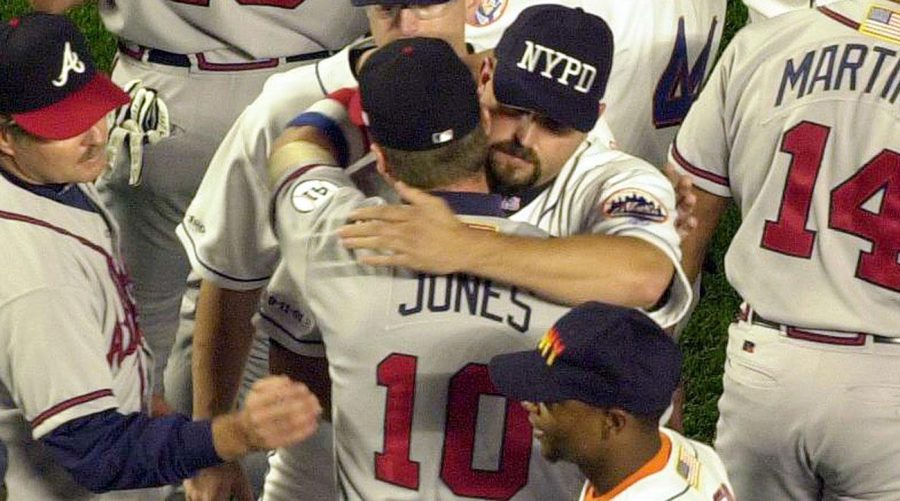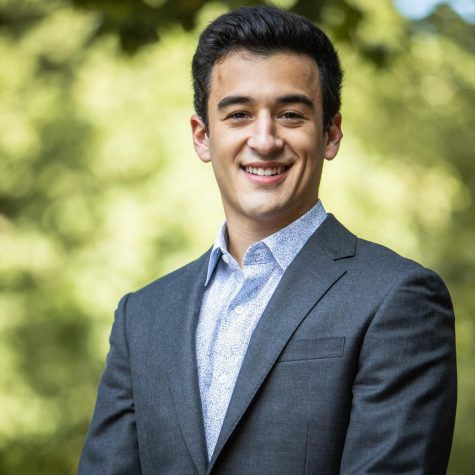“Piazza is going to be the batter. Here is the man the Mets want up in this spot, down one, late in the game.”
Millions of people were glued to their televisions as they listened to the announcer utter those very words.
The first pitch was a fastball up and away. Strike one.
“It was almost like a blur to me. It was almost like a dream, sort of surreal,” Piazza said.
I feel as though any memories I made prior to eighth grade are an absolute blur.
The few I can recollect have something to do with my beloved New York Mets. Why are they so important to me? The simplest answer would be that I grew up in a household of die-hard Mets fans.
It’s more than that.
September 11th, 2001. “I woke up and went for a run. It was a crystal clear blue sky,” my mother said.
She happened to stay home from work later than usual that day, as my babysitter was late once again.
She happened to have worked on the 74th floor of Two World Trade.
“The phone rang a few times and finally, your dad answered. It was a friend, Chris, frantically asking if I had left for work. When your father said no, Chris said to turn on the television. I literally crumbled onto the ground crying in shock and horror.” She described the following days, the following weeks, and the following months in the same way Piazza described his at-bat: a blur.
I was just two years old. I couldn’t process any of what had just happened. As I look back on the tragic events of September 11th, 2001, I always wonder how my hometown, my state and my country was to even begin recovering. Better yet, I ask myself: have we even recovered yet?
Lives were lost, and faith in humanity had gone with them. Even the survivors, like my own mother, felt absolutely helpless. Survivor’s guilt loomed, as more and more names were unaccounted for. The pain kept digging deeper. Would it ever end?
Manhattan, New York, and most of America shut down for a considerable amount of time. It took at least a week for many industries to resume operations. It took even longer just to try and pretend they were okay.
On September 21st, 2001, the first professional sporting event was hosted in New York since the attacks.
The whole country needed something, anything, to bring their minds away from despair.
“It was an important sign of normalcy returning to America,” said George Pataki, the New York State Governor at the time.
Fans needed something to cheer about. New Yorkers needed something to cheer about. The whole country needed something, anything, to bring their minds away from despair.The New York Mets hosted the Atlanta Braves in front of a crowd that neared 42,000 people. The players were sporting FDNY and NYPD hats, to honor the first responders that went into the catastrophe knowing their lives were at stake.
“We as athletes, in a sense, have some sort of ability to focus. We try to revert back to that. I tried to find that and say, ‘man, you know, I feel like I’m going to cry, but I’ve got to do my job.’ So I was torn. We just had to dig down deep and do whatever we could to do our jobs,” said Piazza.
Pressure loomed.
“Karsay has seen Piazza four times previously, Mike is one for four against him. The catcher, Lopez, wants it away. And it’s hit deep to left center!”
Jaws dropped to the floor, as fans rose from their seats. The crowd roared.
“Andrew Jones on the run!”
As the ball soared through the air, people hardly considered if the ball would clear the fence. Instead, they wondered when the ball would clear the fence. It seemed to travel for an eternity.
“This one has a chance!”
A go-ahead homer seemed too good to be true. For many people, it would’ve signified the start of a long, potentially endless, healing process. It can’t be.
“Home Run! Mike Piazza!”
Exhaling. Cheering. Crying. New York was overcome with emotion.
“And the Mets lead, 3-2!”
Piazza’s shot gave the Mets a 3-2 lead, which was eventually the final score of the game. Fans rejoiced. Finally, something to cheer about. Finally, there was hope, inspiration, and a glimpse at what normal life was like.
Sports have a way of evoking emotions on fans and players alike. From the hundreds of firemen and police officers in attendance, to the families of the victims, to two-year-old Simon, unaware that his mother worked in the World Trade Center, lost friends and co-workers but by some miracle escaped her inevitable death, there was something to take their minds off things.
This was more than a game, more than a win.
September 11th, 2001 will forever be the most heartbreaking, agonizing, and scary day of my life, despite the fact that at the time, I didn’t even know what had happened. This hit, this game, did not make us forget. We will never forget; we will continue to honor those who were lost, going about our daily lives with each and every one of them in our minds. Instead, this game marked the start of our rebuilding and healing.
This was more than a game, more than a win. It made us remember, once more, of the very thing that had broken us. But it was also a day of hope. It made us realize that we were one. America was one.
Sports have always been a catalyst for change, even when other methods were proven ineffective. In 1995, when South Africa was awarded the opportunity to host the Rugby World Cup, President Nelson Mandela knew just how powerful it could be. Rugby was played primarily by white men and women, but in the heat of South Africa’s apartheid, Mandela knew the only solution was to bring people together. He found something they could all root for and bond over, and famously said, “Sport has the power to change the world. It has the power to inspire. It has the power to unite people in a way that little else does. It speaks to youth in a language they understand. Sport can create hope where once there was only despair.”
So as blurry and confusing my childhood memories may be, why do they all have something to do with the Mets?
Because the Mets were able to create hope in a time of desperate need. Sure, I had no idea how much we needed a win, but there was one thing, one language I could understand: sports.
That was the language that all New Yorkers used to help overcome the impossible. Much like Mandela used Rugby, New York used the Mets to come together. In fact, Steve Karsay, the Braves pitcher who allowed the home run, was born and raised in New York himself. Karsay has famously spoken about the unifying power of that moonshot, as he said, “if there was any game in my career that I had to lose or take the loss, that’s the one I would have wanted it to happen.”
As we eclipse seventeen years since the horrible attacks, our feelings haven’t changed. We will never forget the lives lost, and we continue to keep those souls close. Thanks in part to Mike Piazza, the Mets, and the true power of sports, we are able to look back at how our resilient country responded. We were given the power to remain hopeful; the power to think that maybe one day, we can rebuild. Even my mother, who had recently overcome cancer and was undergoing fertility treatments, said, “it was an impossible time, but in some ways it renewed my resolve to grow our family no matter the path we had to take to do so. It broke every single New Yorker down, but rebuilt them stronger than ever before.”
“To witness the darkest evil of the human heart and how it tore many loved ones from their families will forever be burned in my soul. But from tragedy and sorrow came bravery, love, compassion, character, and eventually, healing.” –Mike Piazza
Photo: Mike Piazza and Chipper Jones Embrace after the game, by Mark Lennihan, AP Photos/Sports Illustrated



